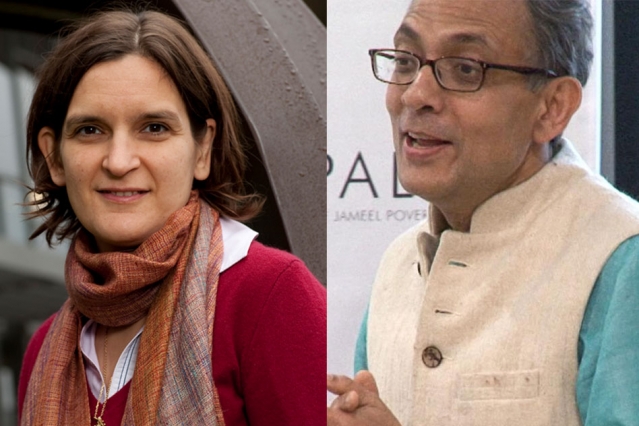By MIT News
Esther Duflo and Abhijit Banerjee, innovative MIT economists whose antipoverty research has given new prominence to the use of field experiments in social science, have been named co-winners of the 2019 Sveriges Riksbank Prize in Economic Sciences in Memory of Alfred Nobel, along with Harvard University economist Michael Kremer.
The work of Duflo and Banerjee has emphasized the use of field experiments in research, to bring the principles of laboratory-style randomized, controlled trials to empirical economics. They have studied a wide range of topics implicated in global poverty, including health care provision, education, agriculture, and gender attitudes, while developing new antipoverty programs based on their research.
In 2003, Duflo and Banerjee (along with Sendhil Mullainathan, now of the University of Chicago) co-founded the Abdul Latif Jameel Poverty Action Lab (J-PAL), a global network of antipoverty researchers that conducts field experiments. J-PAL works to both discern which kinds of local interventions have the greatest impact on social problems, and to implement those programs more broadly, in cooperation with governments and NGOs. Among J-PAL’s notable interventions are deworming programs that have been adopted widely.
Duflo is the second woman and the youngest person ever to receive the Nobel in economic sciences.
Duflo received her undergraduate degree from the École Normale Supérieure in Paris in 1994, after studying both history and economics. She earned a master’s degree in economics the next year, jointly through the École Normale Supérieure and the École Polytechnique. Duflo then earned her PhD in economics from MIT in 1999. She joined the MIT faculty the same year, and has remained at MIT her entire career. She is currently the Abdul Latif Jameel Professor of Poverty Alleviation and Development Economics.
Previously, Duflo has earned a series of awards and honors, including a MacArthur Foundation fellowship (2009), the John Bates Clark Medal from the American Economic Association (2010), and, also in 2009, the BBVA Foundation Frontiers of Knowledge Award for Development Cooperation.
Banerjee received his undergraduate degree from the University of Calcutta, and a master’s degree from the Jawaharlal Nehru University in New Delhi. He earned his PhD in Economics from Harvard University in 1988. He spent four years on the faculty at Princeton University, and one year at Harvard, before joining the MIT faculty in 1993.
Among other honors and awards, Banerjee was elected a fellow of the American Academy of Arts and Sciences in 2004, and was granted the BBVA Foundation Frontiers of Knowledge Award for Development Cooperation in 2009.
Duflo and Banerjee have published dozens of research papers, together and with other co-authors. They have also co-written two books toghether, “Poor Economics” (2011) and the forthcoming “Good Economics for Hard Times” (2019).
Duflo and Banerjee are the sixth and seventh people to win the award while serving as MIT faculty members, following Paul Samuelson (1970), Franco Modigliani (1985), Robert Solow (1987), Peter Diamond (2010), and Bengt Holmstrom (2016).














